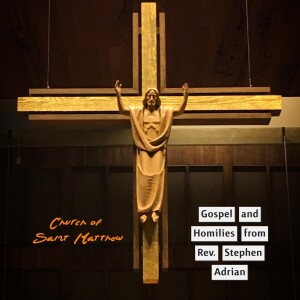
Monday Nov 04, 2024
11.28.2020 Homily
Today we begin the season of Advent, that preparation for the Christmas feast and the Christmas season. And what the Church wants us to do as we enter into this time of preparation, is to recognize some of the very fundamental truths about who we are and what life is about.
The Greeks believed that time was a cyclical thing. It went round and round so that every 3000 years or so, the earth would be destroyed and all humanity would be destroyed. And then the earth would be formed again, and humanity would be formed again. And the process would go on as it had before. So time after time after time, the understanding was that time was cyclical. That's not what we believe though. We believe that time is linear, that there is a goal, that there is a purpose, that there is a direction. Not only in our individual lives, but in the life of all of creation. And that ultimately that direction is to lead us into the kingdom of heaven, into the kingdom of God.
In the very beginning of our Christian life that was what we were charged with, to be alert and to recognize that our lives are going someplace. This evening, we have the opportunity to welcome this child into the household of the faith through baptism. After Phillip is baptized, I'm going to hand a burning candle to parents or godparents, and I'm going to say, "Your child has been enlightened by Christ. May he always walk as a child of the light, so that when the Lord comes he may go forth to meet him with all the angels and saints." It's a statement about the linear understanding of time. Time has a goal. Time has a direction.
And at the very beginning of our Christian lives, we're asked to remember that. Also, we're going to baptize Philip by pouring water over his head. Now that's really a very simple gesture. That's not the way it started. That's not the way baptism began. Baptism was really a very rough experience and it was done with adults. We're told that Jesus was baptized in the Jordan river. And what would have happened is he would have stepped into the water, perhaps up to his shoulders. And then John the Baptizer would have grabbed him by the shoulder and shoved him under the water and held him there--and held him there--and held him there.
And then would release him and let him come up. And he would have spit and coughed. What was attempted to do at the very beginning was to create the image and the experience of dying, and then being brought to life, of death and then resurrection.
Well, we don't do that anymore that way. We've got a little bit more of a civilized way of going about it. But we miss very often the implication of that.
Philip is going to be baptized in the waters of regeneration. Saint Paul says, "If we were baptized with Christ, we were baptized into His death. And if we have died with Christ, then we will reign with Him. Well, each and every one of us has been through that initiation rite, an initiation process.
And as we begin the season of Advent, it might be just well to recall that for ourselves. To spend a little time reflecting on it, meditating on it, thinking about it, ruminating over it. How is that baptism lived out in my life today as I await the coming of the Lord, as I await the fulfillment of the promise, as I await the direction completed in the kingdom of heaven.
No comments yet. Be the first to say something!